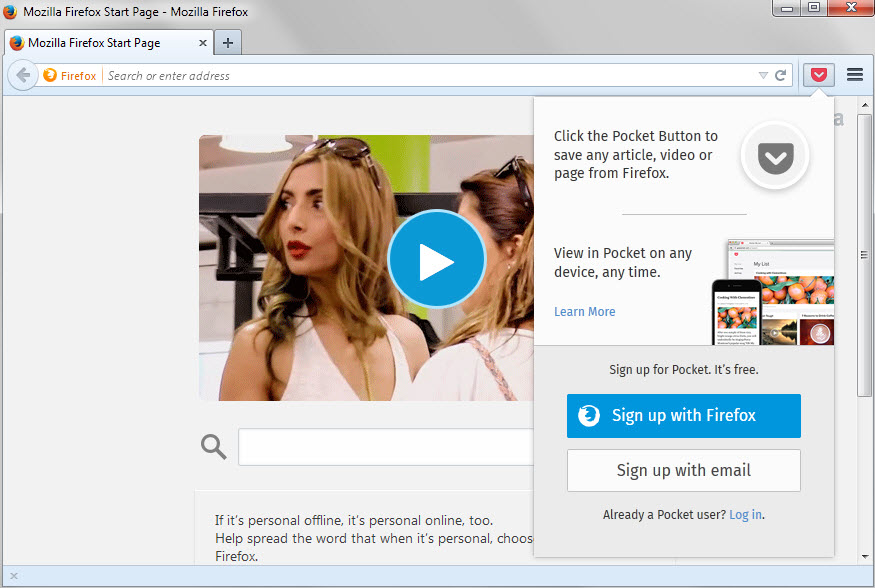Pro and Con of Mozilla’s Pocket integration in Firefox
The native integration of the third-party service Pocket in the Firefox web browser by Mozilla was certainly one of the most controversial topics in recent time when it comes to the browser.
Overshadowed only by the launch of the new Australis interface, the integration was discussed heavily on many Internet sites including ours.
Pocket is a read it later web service that registered users can utilize to save web articles and content to access it at a later point in time. It is like bookmarking but not limited as much in many regards.
The integration in Firefox brings the service to the browser. It is displayed by default in the Firefox interface (on upgrade or new installation), and requires an account before it can be used.

Mozilla's official stance on the integration is that Pocket is a popular useful service that can easily be disabled by users who don't want to use it.
Pocket has been a popular Firefox add-on for a long time and we’ve seen that users love to save interesting Web content to easily revisit it later, so it was an easy choice to offer Pocket as a service in Firefox and we’ve gotten lots of positive feedback about the integration from users.
[..]
Directly integrating Pocket into the browser was a choice we made to provide this feature to our users in the best way possible.
Lets take a look at pro and con arguments for the integration:
Pro Pocket integration
- Firefox users discover the service easily thanks to its native integration.
- The integration makes it as simple as possible to use Pocket in Firefox natively.
- The service itself is useful to some users of the browser.
Con Pocket integration
- Users who don't want to use Pocket need to remove it from the browser or ignore it.
- While Mozilla's implementation may be open source, Pocket itself is proprietary.
- Pocket has been available as an add-on before that users could install.
- Pocket's integration is not opt-in. It is likely that the majority of Firefox users are not interested in Pocket.
- Mozilla is working on Reader Mode which it could easily improve to add read it later functionality to it natively without relying on third-party services.
If you look at the pro arguments, you may notice rather quickly that Mozilla could have selected a different method of integration. For instance, instead of integrating Pocket natively in Firefox, it could have displayed a notification to users advertising it. Users could then decide whether to install the add-on or not.
Or, Mozilla could have deployed Pocket as a browser add-on directly instead. Firefox users could then remove the add-on easily if they did not need it.
Mozilla is about choice, as the organization notes, but it did not give users of the browser any choice when it integrated Pocket natively in it. Firefox users who did not want to use Pocket had to remove it manually from the browser. Mozilla has not published statistics about the use of Pocket in Firefox but it seems likely that only a minority of users are making use of it.
Pocket feedback on Mozilla Input has been overwhelmingly negative (92% sad) in the past 90 days.
While it is certainly true that the organization should not bombard users with prompts for every new feature or change in the browser, it should do so for major changes, especially if the majority of Firefox users are either indifferent to them or objecting them openly.
One option that Mozilla could explore would be to use User Voice or a similar service to get user feedback prior to making changes to the browser to find out if making them is welcome by the majority.
Now You: How should Mozilla handle major Firefox changes in the future?
This article was first seen on ComTek's "TekBits" Technology News

- Log in to post comments